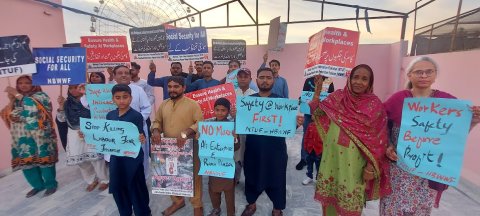
Photo: Solidarity action in Pakistan on the ten year anniversary of the
Rana Plaza collapse (HBWWF, NTUF)
Ten years ago today, apparel companies forced into action by the Rana Plaza factory collapse finally signed a binding agreement with local and global unions to protect Bangladeshi garment workers, with civil society organizations as witnesses.
Now the third iteration of the programme is supported by almost 200 brands and the life-saving work is expanding to Pakistan. Yet there are still brands who will not support factory safety with the proven industry's best standard.
The Accord on Fire and Building Safety was signed by more than thirty brands just three weeks after the deadly Rana Plaza collapse of April 24, 2013, after years of campaigning by unions and labour organizations to make factories in Bangladesh safe for workers. The Accord has brought crucial improvements to 1,600 factories, ensuring the safety of 2 million garment workers in Bangladesh that now have access to an effective and transparent complaint mechanism allowing them to stand up for their own safety. But the work is not finished. Many factories await initial boiler inspections or final safety improvements, and ongoing inspections are necessary to ensure factories do not slip back into unsafe practices.
This is why the Accord, which expires in October 2023, must be succeeded by a new, at least 10-year, negotiated agreement that safeguards all the elements that enabled its success: international legal enforceability for brands, full transparency of the factory remediation process, and equal sharing of power between companies and unions throughout the governance structures and civil society witnesses. Critically, the obligation for apparel and textile brands to ensure remediations are financially feasible for factories must be strengthened, and the speed of expansion to other countries must be increased. We expect all current signatory brands to be committed to such a new agreement.
A decade on, still not signing
To mark the ten year anniversary of the Rana Plaza collapse last month, Clean Clothes Campaign teamed up with Remake and petition platform Eko to urge a “dirty dozen” brands to sign the Accord. This petition, addressing Levi’s, IKEA, Amazon and other brands that have failed to join the Accord, has been signed by more than 63,000 people, a number growing every day.
These irresponsible brands steadfastly refuse to prioritize the safety of workers in their supply chain, and instead continue to use corporate-led audits that not only failed to prevent the Rana Plaza collapse, but also the dozens of mass fatalities that happened in Bangladesh prior to 2013. This group of brands even include those whose labels were found in the Rana Plaza rubble: JC Penney, Walmart, The Children’s Place, and French supermarket chain Auchan that signed the first two Accord agreements but opted out of ensuring a safe supply chain in 2021. Just last month Auchan’s labels were found in a burnt out, collapsed factory in Pakistan, alongside labels of Hampton by Hilton and Dunnes Homes.
This tragic incident that killed four people illustrates the urgency of ensuring swift implementation of the Accord’s programme in Pakistan, following the December 2022 decision to expand to that country. International Accord signatory brands must separately sign the Pakistan Accord to bring their supplier factories in Pakistan under the programme, which 55 leading brands have already done. But some brands which have committed to making factories safe for workers in Bangladesh are leaving their workers in Pakistan out in the cold. Boohoo, Missguided, Esprit, and Fruit of the Loom all have numerous suppliers in Pakistan but have not yet signed the Pakistan Accord.
President of the National Garment Worker Federation in Bangladesh, Amirul Haque Amin, said: “Still many brands sourcing from Bangladesh have not signed the International Accord. As an activist for the garment workers in Bangladesh or for the global South, I urge all brands to sign the International Accord so that the whole supply chain becomes safe for workers in Bangladesh and other production countries.”
Zehra Khan, secretary general of the Home Based Women Workers Federation, said: “We are delighted that the Accord expanded to Pakistan, but it can only be effective if all major brands sourcing from Pakistan join the programme. That is why we urge all apparel and textile brands to care about the safety and health of the workers making their clothes in Pakistan and sign the Pakistan Accord.“
For more information:
- A Decade Of Workplace Health And Safety Under The Accord (International Accord)